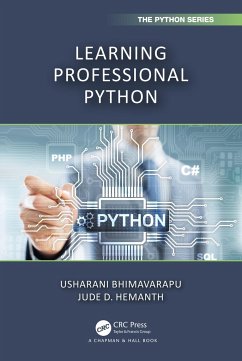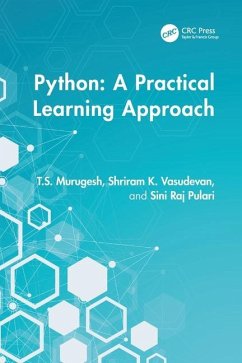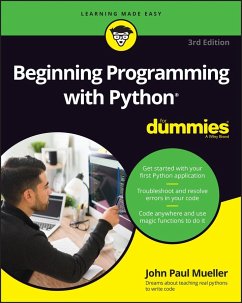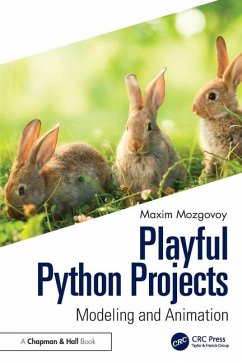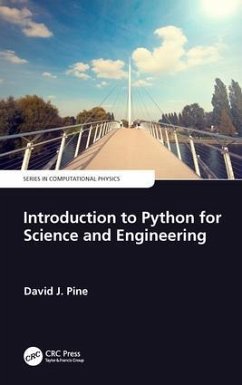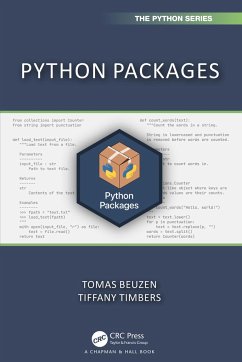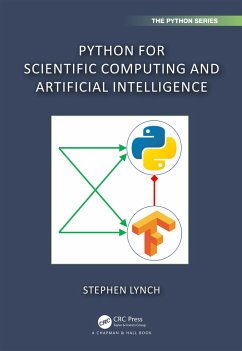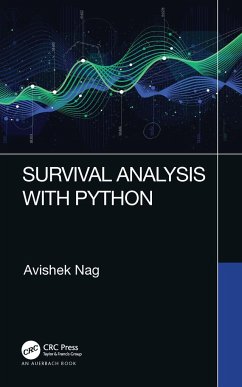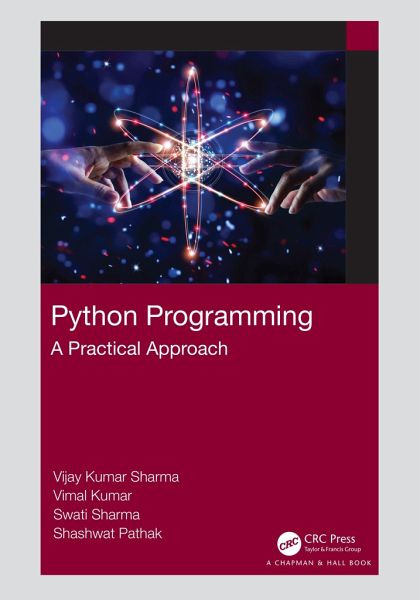
Versandkostenfrei!
Versandfertig in 1-2 Wochen
Weitere Ausgaben:

PAYBACK Punkte
93 °P sammeln!




Purposefully designed to be instantly applicable, PYTHON PROGRAMMING Ã â â A PRACTICAL APPROACH provides implementation examples so that the described subject matter can be immediately implemented by the reader to well-known versatility of Python in handling different data types with ease.
Vijay Kumar Sharma, is an Assistant Professor in the Department of Computer Science & Engineering at MIET, Meerut, (U.P), India. He received his B.Tech Degree in 2012 from Uttar Pradesh Technical University, Lucknow and M.Tech degree in 2017 from Motilal Nehru National Institute of Technology, Allahabad, India. He has published various research papers in International and National Journals and Conferences of high repute. His research interests lies in the area of Cloud Computing, Artificial Intelligence and Blockchain Technology. Various achievements in programming field like winner in 'Coding Competition Zonal Level 2019', winner in 'Smart India Hackathon 2019', winner of 'India-EU-ICT Smart City Hackathon 2019 Pune'. Vimal Kumar is an Associate Professor in the Department of Computer Science & Engineering at MIET, Meerut, (U.P), India. He received his B.Tech Degree in 2007 from Uttar Pradesh Technical University, Lucknow and M.Tech degree in Information Security from Motilal Nehru National Institute of Technology, Allahabad, India in 2011. He did his Ph.D in Computer Science and Engineering from MMMEC, Gorakhpur (AKTU, Lucknow), India in 2017. He has published a large number of research papers in International and National journals and conferences of high repute. His research interests lie in Mobile Ad hoc Network, Network Security and Network Forensics. Swati Sharma did her graduation in Information Technology with Honrs. degree in 2010 and M.Tech with Honrs. degree in 2015. She did her Ph.D. in Computer Science and Engineering. An academician with more than 10 years of teaching experience authored more than a dozen of research papers in reputed Scopus indexed journals, International Journal and IEEE Conferences to her credit. Her areas of interest are Data Mining, Data Analysis, Algorithm Analysis and Design. She is currently doing research in the area of Data Analysis. She has national level certifications on Python and R programming language. She is certified from IBM Db2, RAD, RSA and RTC. She is the prime author of the book, 'Neural Network and Fuzzy Time Series' by International publisher Lambert Academic Publishing. Shashwat Pathak did his graduation in Electronics and Communication Engineering in the year 2009. Later, he completed his Masters in Communication Technology from the Department of Electronics and Communication, University of Allahabad, Prayagraj, India in the year 2012. He earned his Ph.D. from the Department of Electronics and Communication Engineering, Motilal Nehru National Institute of Technology Allahabad, Prayagraj, India (MNNIT Allahabad) in December 2017. His research interest includes Wireless Communication, Telemedicine Systems and Services, Digital Image Processing and designing medical diagnostics & assisting devices for patients. He has received Incubation Offer from Incubation centre, IIT Patna, seed funded by Ministry of Electronics and IT (MeiTY), GoI for his thesis problem's solution "Portable and Automated Cataract Detection and Grading System". He is co-founder and MD of Electro CurietechPvt. Ltd. which works in the area of Medical Electronics, Telemedicine solutions, office IT solutions and consultancy on sustainability. He is Center In-Charge of Atal Community Innovation Center MIET Meerut Foundation, where he is majorly involved in nurturing students and nearby communities for creating impact making innovations and ventures for social causes.
Produktdetails
- Verlag: Taylor & Francis Ltd
- Seitenzahl: 346
- Erscheinungstermin: 7. September 2021
- Englisch
- Abmessung: 260mm x 183mm x 23mm
- Gewicht: 906g
- ISBN-13: 9781032028491
- ISBN-10: 1032028491
- Artikelnr.: 62219744
Herstellerkennzeichnung
Libri GmbH
Europaallee 1
36244 Bad Hersfeld
gpsr@libri.de
Für dieses Produkt wurde noch keine Bewertung abgegeben. Wir würden uns sehr freuen, wenn du die erste Bewertung schreibst!
Eine Bewertung schreiben
Eine Bewertung schreiben
Andere Kunden interessierten sich für





